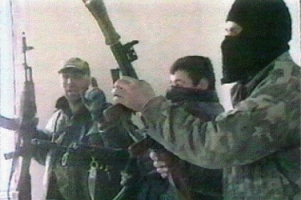Russia prepares to strike back against terrorists
Russia wants Lithuania to close down Chechen terrorists' website, prepares a special plan to struggle with terrorism
Lithuanian ambassador to Russia, Rimantas Shidlauskas, was summoned to the Russian Foreign Ministry on Monday. Russian officials told the ambassador that Lithuania should ban the Chechen terrorists' website, Kavkaz-Center. 
”The continuing existence of the website based on the Lithuanian server will be perceived in Russia as an open unfriendly step of the Lithuanian government to exert negative influence on the atmosphere of our bilateral relations,” a statement from the department of information and press of the Russian Foreign Ministry ran.
On September 10th, the Department of Lithuania's State Security addressed to the committee for journalist ethics with a request to look into the matter of the Kavkaz-Center website. The department asked to see, if the Lithuania-based website of people “sympathizing with Chechnya” propagandized terrorist ideas or stirred the international hostility.
The Kavkaz-Center website is based on the server located in a private apartment in Vilnius. The Department of Lithuania's State Security has already tried to cease the activity of the Chechen online portal before, but the case came to a standstill at court, expecting explanations from the Constitutional Court.
It is well known that Lithuania is one of the basic foreign centers of the Chechen diaspora. In addition to the above-mentioned Internet resource, Lithuania gave shelter to a lot of re-settlers from Chechnya. A lot of Chechen students attend Lithuanian universities. There is a group of fighters for the Chechen independence in the Lithuanian parliament, news agency Regnum reports.
”The most efficient way to struggle against illegal websites is the official way,” Dmitry Leonov, the webmaster of the informational security website bugtraq.ru said. “Internet providers usually include a paragraph in the list of their services, which prohibits the publication of extremist materials. Providers, however, do not carry out any inspections to check the contents of their clients' websites. It usually happens, if a provider and its client speak different languages. A report sent to provider clarifying the contents of a site would be enough to close a site down. In 2001, for example, the Netherlands authorities closed the Dutch version of the pro-Maskhadov Kavkaz-Center website. The site called upon the Muslim youth to fight against the infidel in Chechnya. The materials published on the webpage described the deployment of training military camps. In 2002, soon after the hostage crisis in Moscow, the main version of the Kavkaz-Center website stopped its existence. According to Cnews.ru, Russian and American programmers in California closed the page within ten minutes, after they realized that they had turned out to be terrorist associates against their own will,” the expert said.
In the meantime, the Russian Security Council Secretary, Igor Ivanov, said a special mobilization plan to struggle against the international terrorism would be prepared in Russia. “We are facing the war that international terrorists have declared on us. We need a mobilization plan, which would specify particular actions taken on all power levels – from the president and to local governments,” the secretary said after a government session ended.
Ivanov said that the decision to set up the plan would require changes in the Russian law. “This is not a campaign or separate measures to be taken within a month. It is a plan, which will embrace a long period of time,” the Security Council secretary stated.
The plan will also determine specific obligations and responsibilities for governmental officials, RIA Novosti reports. According to Igor Ivanov, the government has recently discussed special measures aimed at the strengthening of the vertical power structure. “The session was held in connection with the emergent situation, although it is obvious that the conversation touched upon other issues as well. The terrorist act in Beslan was meant to shake the state and weaken the nation,” Ivanov was quoted as saying.
The Security Council secretary also said that the government's activity will not bring any results without the support of the society. Speaking about this issue, Ivanov recollected Putin's initiative to set up a public house, which would hold open discussions regarding government's measures. Ivanov emphasized, though, that the society on the whole should be involved in this work too in order to have the civil control over the government and law-enforcement bodies' actions.
Subscribe to Pravda.Ru Telegram channel, Facebook, RSS!




